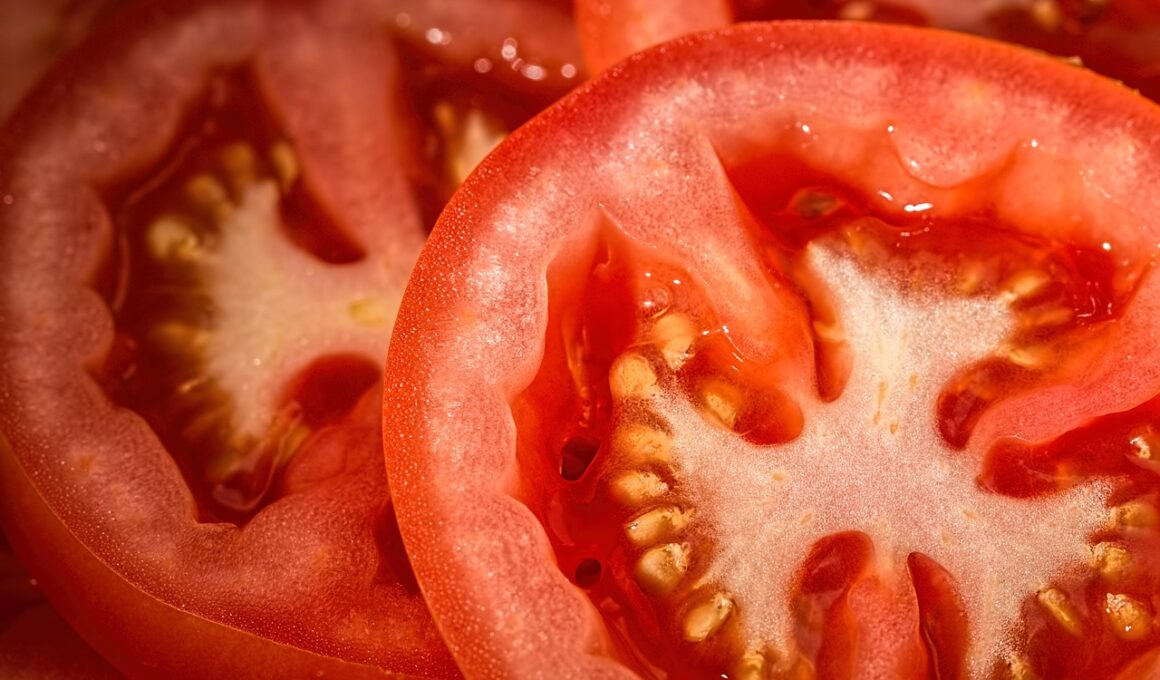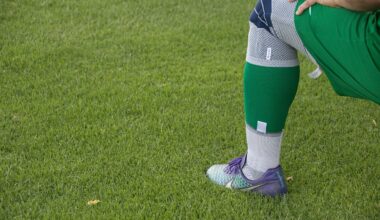The Role of Antioxidants in Athletic Recovery: An In-Depth Look
When athletes engage in rigorous training, they put their bodies under immense stress. This stress produces free radicals, which can cause oxidative damage to cells. Antioxidants play a critical role in neutralizing these free radicals, thereby protecting muscle tissues from damage. High-intensity workouts often lead to inflammation, which can hinder recovery and performance. By incorporating antioxidant-rich foods or supplements, athletes can support their recovery process efficiently. Some common antioxidants that may aid athletic recovery include vitamin C, vitamin E, and selenium. These crucial nutrients contribute to repairing tissues and may reduce muscle soreness after workouts. It is essential for athletes to proactively manage oxidative stress. A well-rounded diet complemented by antioxidants can help reduce the risk of injury and improve overall performance. However, relying solely on supplements without a balanced diet may not yield optimal results. Prioritizing whole food sources of antioxidants ensures athletes receive additional beneficial nutrients. This intersection of nutrition and training is vital for enhancing athletic recovery. As athletes become more aware of their bodies, the importance of antioxidants in their diet continues to gain recognition.
There are several types of antioxidants, including enzymatic and non-enzymatic antioxidants, each playing unique roles in recovery. Enzymatic antioxidants, such as superoxide dismutase, catalase, and glutathione peroxidase, contribute to the body’s ability to mitigate oxidative stress naturally. Non-enzymatic antioxidants, like flavonoids and carotenoids found in fruits and vegetables, provide additional support to offset free radicals. These compounds work together in a synergistic manner, promoting overall health. A diverse intake of antioxidants through various food sources can be particularly beneficial. Examples of antioxidant-rich foods include berries, green leafy vegetables, nuts, and seeds. Incorporating these into daily meals not only supports recovery but enhances overall well-being. Additionally, some clinical studies suggest that antioxidant supplementation might lead to better performance outcomes by reducing fatigue and improving endurance. Yet, over-supplementing can lead to diminishing returns or adverse effects. It is essential for athletes to tailor their antioxidant intake based on personal needs and training intensity. Therefore, working with a nutritionist can provide guidance on proper dosages and timing for optimal recovery benefits while minimizing potential risks.
The Timing of Antioxidant Intake
Timing plays a crucial role in the effectiveness of antioxidants for recovery. Consuming antioxidants before and after workouts can maximize their benefits. Pre-exercise intake may enhance the body’s defense mechanisms against oxidative stress incurred during the workout. Conversely, post-exercise intake aids in reducing inflammation and muscle soreness after physical exertion. For example, consuming a smoothie rich in berries post-workout can provide a quick dose of antioxidants. Research has shown that the timing of antioxidant consumption can influence muscle repair significantly. It benefits athletes to spread antioxidant intake throughout the day, maintaining a steady supply of these essential nutrients. Moreover, pre-workout meals should include easily digestible antioxidant substances to avoid discomfort during exercise. It is advisable to choose whole food sources where possible, as they provide other necessary nutrients vital for recovery. Supplements can fill nutritional gaps but should complement a healthy diet rather than replace it. Individual variability in absorption and efficacy highlights the importance of personalized nutrition. Experimenting with different timing strategies may lead athletes to best understand their recovery needs and optimize performance overall.
The role of antioxidants is not limited to recovery alone; they are also valuable in enhancing overall athletic performance. Some studies suggest that habitual intake of antioxidants may lead to adaptations that improve endurance and exercise capacity. This leads to additional interest in supplementation for athletes who engage in training aiming for peak performance. Critical factors influencing the effectiveness of antioxidant supplementation include type, dosage, and duration of use. High doses can sometimes lead to imbalances, creating an environment that might counteract athletic gains. Athletes must consider their specific training regimens while deciding on the inclusion of antioxidants in their routines. Furthermore, engaging in varied activities may require adjusting antioxidant intake according to individual intensity levels. Seasonal training also plays a role, as different times of year may affect an athlete’s nutritional needs. While seeking to enhance performance, it is vital to maintain a balance. Supplements can be useful tools, but they should be used wisely, taking into account the quality of overall nutrition. A holistic approach that includes proper training, recovery strategies, and nutrition should always be the primary focus.
Potential Risks of Antioxidant Supplements
While antioxidants have many benefits, excessive intake, especially through supplements, can pose risks. Somestudies hint that high doses may interfere with the body’s natural ability to adapt to exercise. This interference could potentially hinder long-term performance improvements. With so many options available on the market, choosing the right form and dose is critical. Athletes must be cautious about selecting products that have been tested for purity and efficacy. Unregulated supplements might contain additional substances that can negatively impact their health or performance. As a result, educating themselves on recognized brands and products is essential. Monitoring the response to supplementation should also be a part of the athlete’s strategy. Keeping a workout and nutrition journal can provide insights into the effects of antioxidants on their performance and recovery. Moreover, consulting with healthcare professionals or sports dietitians can help tailor strategies throughout the training season. Evaluating dietary sources and addressing any deficiencies together ensures a more sustainable approach. Balancing antioxidant needs with overall health objectives is vital for athletes looking to optimize performance while preventing injury.
In conclusion, antioxidants serve a valuable purpose in athletic recovery by combating oxidative stress and inflammation. While supplements can play a role, relying solely on them without proper nutrition is inadvisable. Athletes need to emphasize a well-balanced diet, incorporating a wide array of fruits and vegetables to meet their antioxidant needs naturally. Prioritizing rich food sources provides numerous additional benefits, such as essential vitamins and minerals. Evaluating one’s body and performance consistently allows for adjustments in diet or supplementation as needed. As research on antioxidants continues to evolve, athlete awareness regarding their proper use should remain central to performance strategies. Ultimately, understanding the balance between antioxidant intake, training regimens, and recovery practices will enhance athletic achievement. The journey of athletic excellence is complex, involving an interplay between physical training, nutrition, and recovery. By recognizing the importance of antioxidants, athletes can make informed choices that contribute to optimal health and performance. Investing time in nutrition education is essential for navigating supplement options, enhancing workout recovery, and gaining a competitive edge in sports.
Final Thoughts
In today’s competitive sports environment, athletes cannot afford to overlook any aspects of their training and recovery. Antioxidants hold significant potential for enhancing athletic recovery, but they must be implemented thoughtfully. Personalizing intake based on individual needs, training intensity, and recovery timelines ensures that athletes reap the full benefits. Balancing antioxidant consumption with overall health objectives fosters sustainable performance improvements. Furthermore, keeping abreast of new research and recommendations is central to making informed decisions about nutrition and supplementation. As athletes strive to reach their best, understanding the role of antioxidants and how they fit within a holistic approach to athletics maximizes outcomes. Working closely with professionals in sports nutrition helps tailor these strategies – creating better pathways to sustaining hard-earned progress. The ongoing dialogue regarding nutrition and performance reveals that there is still much to learn. Scholars and practitioners alike are continuously studying how antioxidants and other nutrients can impact athletic recovery and performance. Walking this fine line between supplementation and whole foods will lead to better health and resilience in sports.
As the field of sports nutrition evolves, the conversations surrounding supplementation of antioxidants will undoubtedly grow richer and more nuanced. Athletes equipped with this knowledge pave the way not only for their recovery but for future athletes seeking guidance. Knowledge sharing among peers, coaches, and nutritionists creates a supportive environment for developing effective recovery strategies. A culture of informed decision-making will empower athletes as they navigate their individual recovery journeys. Keeping in tune with the body’s responses to dietary strategies enhances self-awareness, fostering an environment for consistent improvement. Educational initiatives targeting schools and sports programs about the role of antioxidants can transform future generations of athletes. By advocating for a comprehensive understanding of nutrition, the benefits can extend beyond competition enhancing performance, recovery, and overall well-being. This holistic approach to sports nutrition has long-term benefits that far exceed immediate gains. The partnership between asserting the importance of antioxidants and supporting athletes can significantly shape the landscape of sports performance. The road ahead will necessitate collaboration, continuing education, and adaptability in an ever-evolving field of sports nutrition.


